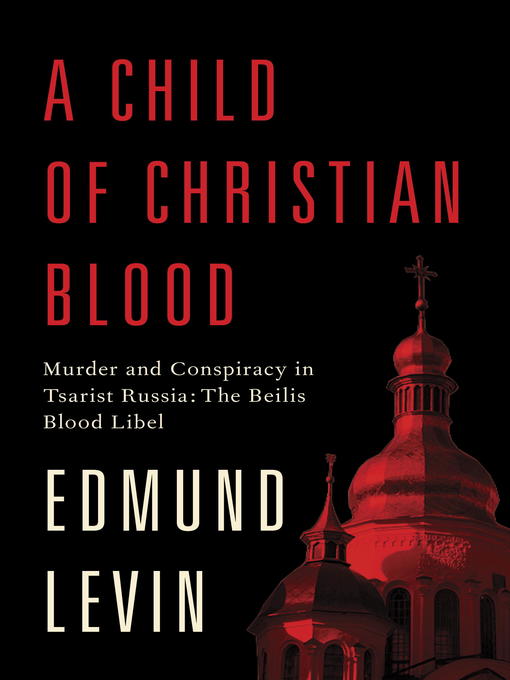
A Child of Christian Blood
Murder and Conspiracy in Tsarist Russia: The Beilis Blood Libel
کتاب های مرتبط
- اطلاعات
- نقد و بررسی
- دیدگاه کاربران
نقد و بررسی

November 11, 2013
Good Morning America writer/producer Levin makes a century-old murder case come to life in a suspenseful true crime thriller that had broad implications at the time. The March 1911 discovery of the butchered corpse of 13-year-ol Andrei Yuschinsky in a cave near Kiev led, four months later, to the arrest of a brick factory clerk, Mendel Beilis, who was accused of committing the murder as part of a barbaric ritual in which the Christian victim’s blood was drained to be consumed by Jews. That the evidence against the defendant was nonexistent was no bar to his prosecution, even as witnesses provided compelling testimony pointing to more likely murderers. Although the 1913 trial—“surely one of the most bizarre ever tried in an ostensibly civilized society”—was an international cause célèbre, prompting the largest Jewish-Christian solidarity protests in the U.S. to that time, the story and its details remain obscure today. Levin’s stellar recreation of the personalities and events places them into the context of Russia during the last years of the tsar, and makes good use of records unavailable before the fall of the Soviet Union. Agent: Renee Zuckerbrot, Renee Zuckerbrot Literary Agency.

December 1, 2013
A page-turning history/true-crime story surrounding the myth of blood libel, the idea that "Jews commit ritual murder to obtain Christian blood" to use in Passover rites. The fiction of blood libel can be traced precisely to Thomas of Monmouth, who first published the accusation in 1150. No matter how many bishops, popes and monarchs unreservedly rejected the accusation, it has managed to pop up with alarming regularity. The late 19th century was particularly virulent, with 79 cases alleging ritual murder in Eastern Europe. At that time, Russia maintained nearly 1,500 anti-Semitic statutes on their books. The 1911 case of Mendel Beilis, who was accused of the murder (and supposed blood libel) of teenager Andrei Yushchinsky, is a perfect fit for the talents of Emmy Award-winning Good Morning America writer and producer Levin. His easy narrative style makes the book read like a novel as he points out the absolute absurdity of the baseless accusation. His comprehensive research uncovered proof that just about every security official involved found no reason to charge the young factory worker. The obsessive anti-Semite Vladimir Golubev was the first to accuse Beilis, and his fellow right-wing groups took up his cry for blood and threats of pogroms. Those who felt most strongly that it was a Jewish plot were, unfortunately, those who had the most influence: Czar Nicholas II and the chief prosecutor for the Kiev Judicial Chamber, Grigory Chaplinsky. The primary witnesses for the prosecution were three alcoholic derelicts who were primed with vodka before their statements were taken. "The ordeal of Mendel Beilis stands as a cautionary reminder of the power and persistence of a murderous lie," writes the author. "In the twenty-first century, the Blood Libel is still with us." Levin manages to tell the story clearly without provocative bias while pointing out how the entire world demonstrated their incredulity at the absurdity of the entire episode.
COPYRIGHT(2013) Kirkus Reviews, ALL RIGHTS RESERVED.

February 15, 2014
Relying on a previously top secret and unexplored trove of documents, Levin (producer, Good Morning America) tells the fascinating and disturbing story of a Jewish man falsely accused of murdering a boy in Kiev in 1911. The trial of Mendel Beilis was less a legal proceeding than a spectacle of anti-Semitism and political maneuvering. Levin chronicles the often hypocritical outrage from Europeans and Americans who denounced the Russian government for their persecution of the innocent Beilis. Although the case faded from popular consciousness, Levin argues that it was the culmination of about 100 ritual murder accusations throughout Eastern and Central Europe, serving as a warning sign of the horrors to come in World War II. Andrei Yushchinsky, the boy whose murder was never solved, is celebrated as a martyr by modern anti-Semitic groups. Readers will likely be convinced by Levin's assertion that the most plausible killer was a career criminal who feared Yushchinsky would report on her and her gang to the police. The story of the investigation and trial is complicated, and readers will find the book's "Cast of Characters" listing helpful. VERDICT History buffs and scholars alike will find this detailed examination of the case worth reading.--Kate Sheehan, Waterbury, CT
Copyright 2014 Library Journal, LLC Used with permission.

December 1, 2013
In 1911 in Kiev, Russia, Jewish factory worker Mendel Beilis was arrested for blood libel ( ritual murder to obtain Christian blood ) after the body of a young boy was found in a cave near the brick factory where he worked. Despite evidence to the contrary, the trial began in 1913. The prosecutors came to care little about whether Beilis was guilty or innocent. What they wanted to prove was the notion that the Jewish people had used Christian blood in their rituals. The world watched, and such luminaries as Jane Addams and Booker T. Washington rallied against the injustice. Levin has used archival materials, including the original case files, made available after the fall of the Soviet Union. His detailed description of the trial and the events leading up to it will likely leave contemporary readers as stunned and horrified as many observers at the time were. This is a fascinating and disturbing depiction of the blood libel and a cautionary reminder of the power and persistence of a murderous lie, one that, Levin notes, persists even in the twenty-first century.(Reprinted with permission of Booklist, copyright 2013, American Library Association.)

























دیدگاه کاربران